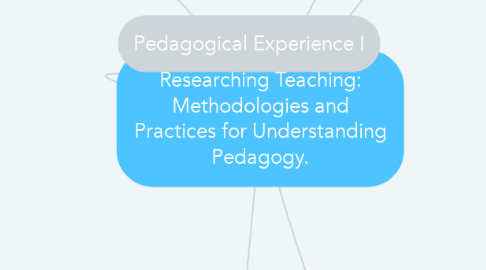
1. Bibliography: Loughran, J. J. (1999). Researching Teaching: Methodologies and Practices for Understanding Pedagogy. London: Routledge. Chapters 1 to 4
2. Pedagogical Experience I
3. Research and practice
3.1. It is necessary to continue forging links between research and practice.
3.2. John Smyth's approach to research clearly demonstrates how working in partnership with schools opens up possibilities for teachers to use initiatives and opportunities in ways that can be most advantageous and beneficial to the local school community.
3.3. There are many barriers for teachers to participate in research, poor structures for communicating research, and incentives, so the spirit of inquiry is not transmitted to students.
3.4. It is necessary to create a direct influence on the research, so that it directly deals with classroom topics and teachers find useful and flexible approaches.
3.5. The kind of idea and advice one gives teachers depends in part on what the teaching looks like.
3.6. Teaching has elements of a craft, a science and an art, each of which have different implications for attempts to improve classroom practice.
3.7. Traditional teaching culture frames teaching primarily as a trade, with new teachers needing knowledge of what to do and how to do, in a variety of common classroom situations.
3.8. This culture is suspicious of attempts to turn teaching into a science, through the practice of empirical research and theoretical development that explains and predicts successful practice.
4. The classroom as an educational context
4.1. Teaching work begins with a comprehensive overview, while interacting with many factors and getting to know your classroom.
4.2. The primary role of the teacher means new findings for teaching, creating new ideas and possibilities.
4.3. Importance of understanding and articulating specialized knowledge of teaching.
4.4. Importance and value that defy stereotypes in the classroom and possible outcomes.
4.5. Teaching approaches that value personal learning from experience find meaning for their own science or teacher training classrooms.
4.6. The physical environment of human beings provides experiences that people in different geographic locations may not find.
4.7. Improving classroom learning requires both artisanal and scientific knowledge, but the complexity of classroom teaching means that it also has elements of an art.
4.8. There are some aspects and examples of specialized teaching that are highly creative. and they cannot be coded and taught in advance.
4.8.1. Table 4.4 Teaching principles for quality learning (Mitchell and Mitchell, 1997, p. 114)
4.8.2. 1 Share intellectual control with students.
4.8.3. 2 Find times when students can solve some (or all) of the content or instructions.
4.8.4. 3 Provide opportunities for independent choice and decision making.
4.8.5. 4 Provide a wide range of ways to experience success.
4.8.6. 5 Promote conversation that is exploratory, tentative, and hypothetical.
4.8.7. 6 Encourage students to learn from other students' questions and comments.
4.8.8. 7 Build a classroom environment that supports risk taking.
4.8.9. 8 Use a wide variety of intellectually challenging teaching procedures.
4.8.10. 9 Use teaching procedures designed to promote specific aspects of quality learning.
4.8.11. 10 Develop students' awareness of the big picture: how the various activities combine and link to the big idea.
